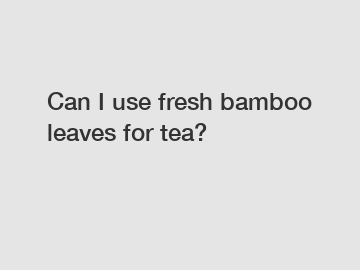Can I use fresh bamboo leaves for tea?
Can I Use Fresh Bamboo Leaves for Tea?
Can I use fresh bamboo leaves for tea? This intriguing question has piqued the curiosity of many tea enthusiasts. Bamboo is often associated with strength and flexibility, but can its leaves also be transformed into a refreshing and revitalizing beverage? Let's explore this topic further and shed some light on whether fresh bamboo leaves can indeed be used for tea.
1. Bamboo Leaves in Traditional Medicine:

Bamboo leaves have been embraced for their medicinal properties in traditional Eastern medicine for centuries. They are believed to possess a variety of health benefits, including anti-inflammatory and antioxidant effects. This highlights the potential for using bamboo leaves in beverages like tea to leverage their medicinal properties.
2. Nutritional Value and Flavor Profile:
Fresh bamboo leaves are a rich source of vitamins, minerals, and dietary fiber. They contain essential nutrients such as vitamin C, vitamin B6, and potassium. Additionally, bamboo leaves possess a unique flavor profile that can be both subtle and slightly grassy, adding a distinct taste to any tea infusion.
3. Creating Bamboo Leaf Tea:
To make bamboo leaf tea, start by harvesting fresh bamboo leaves. Ensure that the leaves are free from pesticides and other contaminants. Next, rinse the leaves thoroughly under running water to remove any dirt or impurities. Depending on personal preference, the leaves can be used fresh or dried for future use. If drying, spread the leaves in a single layer and allow them to air-dry until they are crisp and brittle.
4. Brewing Techniques:
When it comes to brewing bamboo leaf tea, experimentation is key. There are no strict rules or traditional methods to follow. However, here's a general guideline to get you started: Take a handful of fresh or dried leaves and place them in a teapot or infusion vessel. Pour hot water over the leaves and let them steep for about 5-10 minutes. Adjust the steeping time to suit your taste preferences. It is also possible to blend bamboo leaves with other herbs or tea leaves to create unique flavor combinations.
5. Health Benefits and Potential Uses:
By incorporating fresh bamboo leaves into your tea routine, you might enjoy several potential health benefits. Bamboo leaves are believed to have antiviral, antibacterial, and antifungal properties. They may aid digestion, boost the immune system, and even promote cardiovascular health. However, it is important to note that scientific research on the health benefits of bamboo leaf tea is limited, and further studies are needed to establish its efficacy fully.
6. Precautions and Considerations:
While bamboo leaf tea holds promise, it is essential to exercise caution. Some individuals may be allergic to bamboo leaves, experiencing symptoms such as skin itching or respiratory difficulties. If you have any pre-existing allergies or medical conditions, consult a healthcare professional before consuming bamboo leaf tea. Additionally, pregnant or breastfeeding women should also seek medical advice before incorporating bamboo leaf tea into their routine.
In conclusion, the question "Can I use fresh bamboo leaves for tea?" can be answered with a resounding yes. Bamboo leaves can be transformed into a delightful tea, offering their unique flavor profile and potential health benefits. However, it is essential to ensure the quality and safety of the leaves used and to approach bamboo leaf tea consumption with awareness of potential allergies or contraindications. So, why not embark on this tea adventure and explore the world of bamboo leaf tea for yourself?
The company is the world’s best Vacuum Packing Bamboo Leaves For Sushi Food, Green Bamboo Leaves, Fresh bamboo leaves for decoration supplier. We are your one-stop shop for all needs. Our staff are highly-specialized and will help you find the product you need.
252
0
0

Comments
All Comments (0)